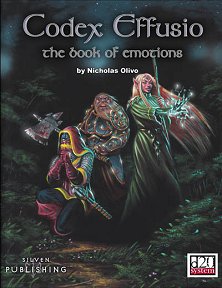
Written in the words of one Johara Gway, who has observed the ways of men (and other sentients) in his travels, this product sets out to codify in game rules some of the ways in which emotions can be used to effect in role-playing. It is not some deeply psychological tome, however, but a collection of feats, prestige classes, items and spells which all in some way use or play upon emotions.
In the introduction, Gway talks about how people are driven by emotions, be they that individual's general outlook on life or by those generated by the moment - fear, joy and so on. Many of the greatest adventurers, the ones that bards sing about, are able to harness and use emotions, rather than be ruled by them. The rest of the book provides the tools to allow characters to do just that.
The feats are mostly based around the concept of 'disposition' - some people are naturally sunny and optomistic, while others are gloomy and rarely look on the bright side of life. Feats classed as disposition feats may normally only be taken at character creation, however if events conspire to completely change a character's outlook on life - perhaps he finds religion, or his whole family is wiped out - the original feat chosen may be changed, with the DM's permission, for another that is more appropriate to the new attitude with which the character approaches life.
There are also general feats, and 'traumatic' ones, which are triggered by some dramatic event such as the near-death of the character... hmm, not sure I'd want to spend a feat slot on the ability to get one last good thump in on my opponent before dropping dead! Each feat gives a specific advantage, for example, if you are Courageous, you get a bonus to Will saves against fear effects - and of course, you likely are known as a very brave person.
The prestige classes are all a bit odd, and probably more use as NPCs than as a way to develop your character. They are, however, quite interesting and insightful, and could give a good underpinning to certain personalities... perhaps being a Defiler would suit a cleric of a god of decay, or some nihilist who believes that the whole world is heading for destruction and is happy to help it along a bit. You don't want to ask him round to dinner, though, as he can cause food to become rotten and similar unpleasant things. A bard who becomes an Exuberant, on the other hand, might be good company as he can always lift your spirits and adds bonuses to his companions' morale checks. The Phobist uses fear as a weapon and could make, for example, a real 'fire and brimstone' preacher; while the Furyon can harness rage in a manner that makes a beserk barbarian look like a pussy cat!
The magic items will cause the DM no end of fun! How about an alchemical toxin that causes apathy... paint that on an arrow head and fire it at someone who seems hell-bent on causing you trouble, and attacking you will suddenly become far too much of a bother. Or maybe the Mantle of Innocence, which gives a bonus to bluff checks as the wearer just emanates honesty. Some bring mixed blessings, such as the security blanket. This is a bedroll that confers endure elements, only after you have used it for a while you cannot bear to be without it.
Finally, there are a few spells which affect their target's emotions and reactions - for good or ill, depending on the spell and on your point of view of course. Inflict someone with an inferiority complex and he feels obliged to attack the largest, hardest foe that he can see just to prove himself! Postitive thinking, on the other hand, gives the recipient a morale bonus to attack and damage.
Overall, a useful collection that, used sparingly, could add interest to your game.
Return to Codex Effusio: The Book of Emotions page.
Reviewed: 17 December 2006

